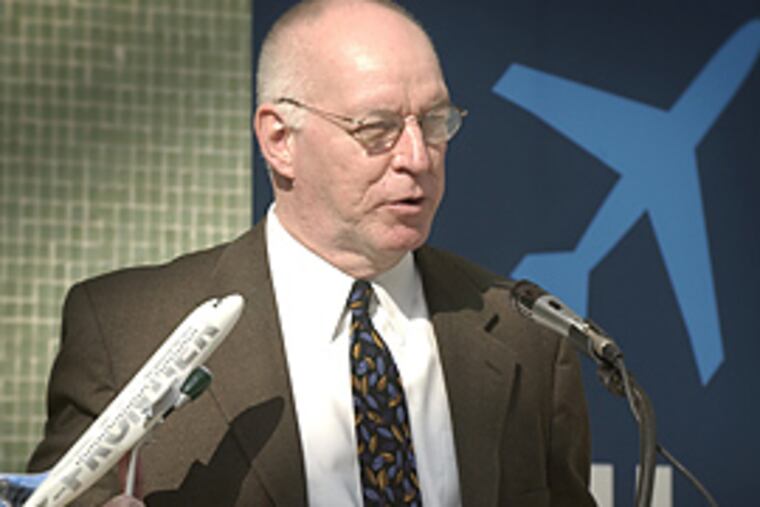Aviation director takes questions
Philadelphia's acting aviation director, Charles J. Isdell, thinks the impact on Philadelphia passengers would be "minimal" if US Airways and United Airlines merged.

Philadelphia's acting aviation director, Charles J. Isdell, thinks the impact on Philadelphia passengers would be "minimal" if US Airways and United Airlines merged.
One question, though, is whether the city would lose some international services since United has an international hub at Washington Dulles International Airport. Isdell thinks not.
Since January, Isdell has met weekly with US Airways officials based here, and he cites greatly improved cooperation from the region's dominant airline, on everything from baggage handling to customer service. Isdell credits US Airways' new management team in Philadelphia, and the involvement of Mayor Nutter.
Question: How would a US Airways and United merger affect Philadelphia passengers and the airport?
Answer: We believe we would continue to be a hub. One issue, if this merger happens, is would Philadelphia continue to be an international gateway, as US Airways has developed us? I'm optimistic we would. The new airline would have both Philadelphia and Washington Dulles for flights to Europe and beyond. I don't believe we would lose. We are a more logical launching point for international growth than Dulles.
Q: Could Philadelphia lose flights either due to antitrust concerns or economies sought by a merged airline?
A: I don't see a merger having a major impact on Philadelphia. United has only 20 flights a day out of Philadelphia to five cities - Chicago, Denver, Los Angeles, San Francisco and Washington.
Q: Where could economies come in a merger?
A: The new airline might reduce the number of overlapping daily flights to Los Angeles, San Francisco and Washington - cities where US Airways and United are the only carriers flying. There's a good chance they would raise fares on those routes.
Q: What could Philadelphia do to create more competition for those routes?
A: We'd go to a carrier and say, "In the interest of our passengers we'd like to have flights to the West Coast on more than one carrier."
The city would try to get assurances the new airline would not impose monopolistic prices to cities where they are the only carrier. We will look at that issue over the next several months, should this proceed to a federal regulatory process.
Q: If US Airways and United merge, would service change or fares go up?
A: We would not lose nonstop service from Philadelphia to Los Angeles or San Francisco. But the fares might jump up on flights where there's no competition. We would still have service to both Reagan National and Washington Dulles, but you might find a tendency for the fares to go up.
Q: Do mergers create confusion and poor customer service?
A: Yes, there will be operational concerns. Most analysts refer to the growing pains of US Airways and America West. US Airways continues to have minor problems with merging reservations systems.
Q: Are US Airways operations in Philadelphia getting better?
A: Yes. US Airways has a new team in Philadelphia that's been extremely effective. They have made a lot of headway the last four to six months. It took too long, and we were not happy. To some extent, it took the new mayor sitting down with them and telling them 'You are hurting my city' to get them focused on Philadelphia. They have, in fact, turned things around here recently.
Q: US Airways executives recently praised Philadelphia. What is the city doing?
A: When Michael Nutter took office, he met with US Airways and basically said, 'What I want for my citizens is better service in Philadelphia.' It was very timely because US Airways had just brought in a new team of executives to run their Philadelphia operation - Bob Ciminelli and Suzanne Boda. Ciminelli runs the daily operation now and he is excellent. Suzanne Boda is more focused on international growth. They have a new attitude that Philadelphia is a big money maker for them.
Q: What happened?
A: After the mayor met with US Airways, he sent specific orders to me to work with the new US Airways team consistently and aggressively to improve the passenger experience here. So we did. We've met every Friday with Bob Ciminelli since January. We are planning for the summer, which is our busiest time. We are more prepared for a summer operation than we've ever been. There's just a new attitude. It has a lot to do with their new team, Boda, Ciminelli and Robert Isom, chief operating officer. They often refer to Philadelphia as the "gem" in their system because we produce revenue.
Q: Is the city helping US Airways?
A: We have a proposal to add a pier to the international terminal and, in the short term, get them some additional parking positions. Unfortunately, all airlines right now are a little reluctant to announce new service because they are fighting the cost of jet fuel. Most airlines right now are dealing with issues more related to survival than expansion.
Q: Isn't US Airways investing $35 million at the Philadelphia airport, including $18 million in a new maintenance building?
A: Yes, and it's been badly needed for a long time. The old US Airways was in and out of bankruptcy twice and not able financially to maintain their infrastructure. Now, the company has cash and they are reinvesting it. We are very happy they are doing it.